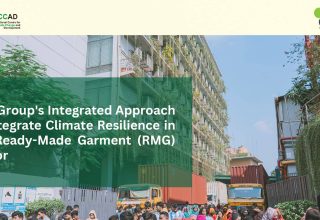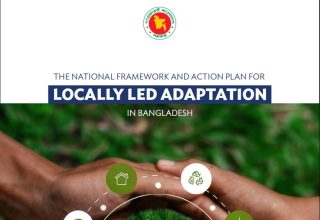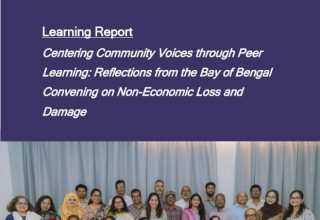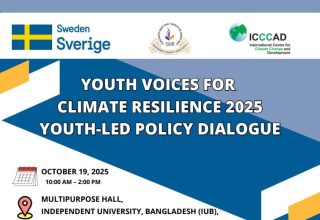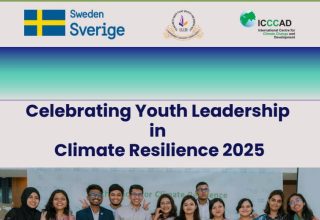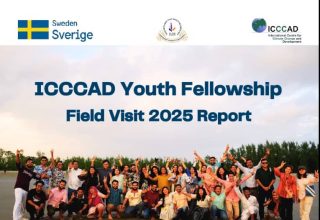Climate-induced rural livelihood loss and consequent rural-urban migration is a common scenario in developing countries. However, little is currently known about the dynamics of the process of climate-displaced migration and the experiences of associated migrants. My research has been an attempt to understand how poor climate-induced migrants perceive their urban conditions in hydro-geophysical and socio-economic terms.
Dhaka City, the densely populated capital of Bangladesh, is highly vulnerable to the impacts of climate change. In the future a sustained influx of climate-induced migrants is likely to join the ranks of the urban poor, where they will have to face new hazards of city life. Therefore, in this research I have tried to answer questions regarding the extent to which climate-induced migrants’ aspirations have been fulfilled after migration and whether their vulnerability to different hazards is different than that of non-climate-induced migrants.
Available research has given the term ‘climate-induced migrants’ to those who have migrated mainly due to problems of the type climate change is expected to cause; for example flood, cyclone, river bank erosion, waterlogging, drought and salinity intrusion. In my research, I used a tracer survey and snowball process to identify poor climate-induced migrants in Korail, one of the largest slums in Asia. Questionnaire surveys, focus groups and personal interviews were the main research methods employed.
I argue that climatic factors have never affected any other group so severely at both their origin and destination as they have affected poor climate-induced migrants. These migrants face more severe repercussions from some hazards than other types of migrants due to the differences in their financial and coping capacities and educational qualifications. Finally, I identify illiterate female climate-induced migrants that have recently arrived from a cyclone prone area as the most vulnerable population. With the rapid rate of urbanization and climate change, this is high time to identify such migrants and create separate plans under which to provide support for them.
-
CLIMATE INDUCED DISPLACEMENT IN BANGLADESH THROUGH THE LENS OF ‘LOSS AND DAMAGE’
This article looks at the economic and non-economic ‘‘loss and damage’ (L&D) of commun… -
The conference for a climate-resilient Bangladesh #Gobeshona3
Day 1: Research into Use Inaugural Session of Gobeshona3 Great start to 4-day #Gobeshona3 … -
DAY – 3 : The First Annual National Conference on Urban Resilience 2016
The last day of the First Annual Urban Conference kicked off with the topic “Financing the… -
DAY – 1 : The First Annual National Conference on Urban Resilience 2016
The First Annual National Conference on Urban Resilience is being organized by Internation… -
COP21: Why the Paris talks must tackle climate-forced migration
With the crisis of refugees arriving in to Europe from Syria and other countries in Asia a…
Load More Related Articles
-
A Case Study of Navigating the Just Transition: DBL Group’s Integrated Approach to Climate Resilience in the Ready-Made Garment (RMG) Sector
This case study examines DBL’s adaptive and pioneering role in making the RMG sector… -
The National Framework and Action Plan for Locally Led Adaptation in Bangladesh
The Bangladesh National Adaptation Plan mandates the creation of a framework for climate a… -
Learning Report | Centering Community Voices through Peer Learning: Reflections from the Bay of Bengal Convening on Non-Economic Loss and Damage
This report synthesizes the key findings and outcomes of each session of the “Bay of… -
Event Report | Youth Voices for Climate Resilience 2025 : Youth-led Policy Dialogue
Bangladesh stands at the frontline of climate impacts, where shifting rainfall patterns, s… -
Event Report | Celebrating Youth Leadership in Climate Resilience 2025
On 19 October 2025, at the Multipurpose Hall of Independent University, Bangladesh (IUB), … -
Field Visit Report | ICCCAD Youth Fellowship-2025
The ICCCAD Youth Fellowship is a flagship initiative under the project “Capacity Strengthe…
Load More By ICCCAD
-
Breaking the Chains of Gender Bias: A Reflection on International Women’s Day Discussion
Every year, 8th March is dedicated to all the women globally to amplify their powerful voi… -
Exploring the Land of Chuijhal and the Sundarbans
My recent addition to ICCCAD’s CAP-RES project team as a Project Officer – You… -
The Girl and the Hidden Losses of Her World
On the edge of a wide, turbulent river stands a young girl, her bare feet touching the ear…
Load More In Blog
Check Also
Locally Led Participation in Action: Reflections from the Field on Inclusive Adaptation and Social Agri-Business Models
As part of an ongoing action research initiative, our team has been co-facilitating the se…



